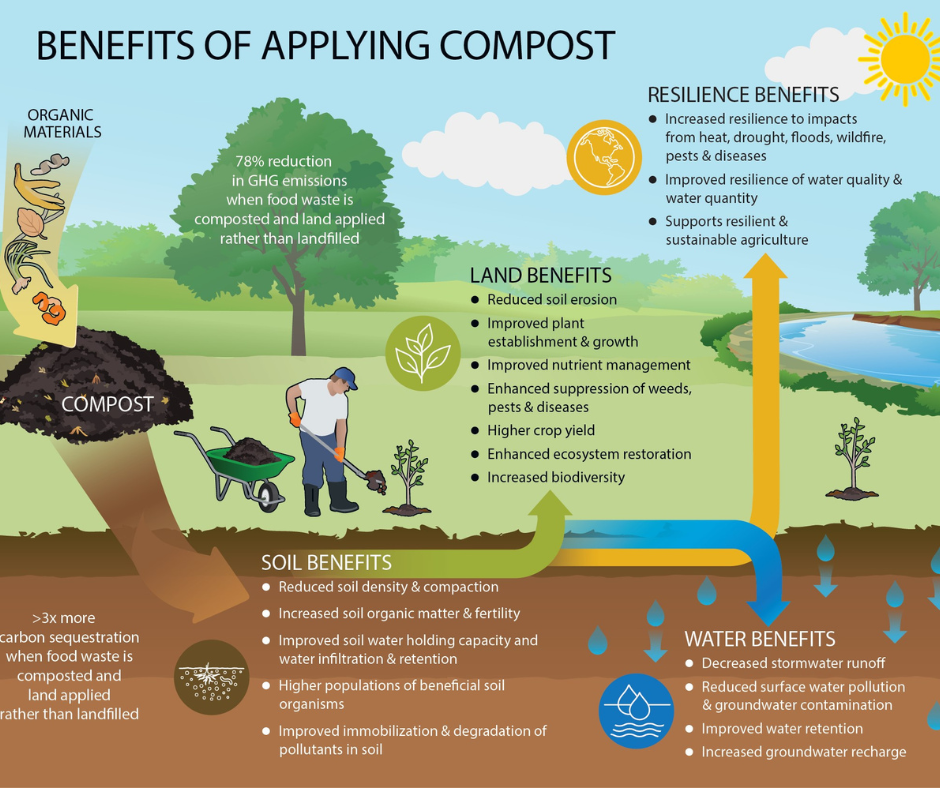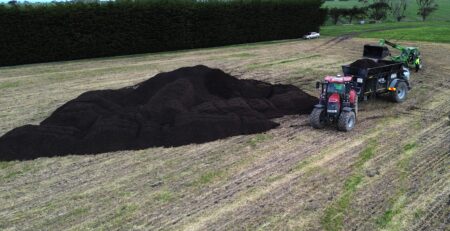Organic Compost on Canterbury Farms
CIA Ltd Champions the Advantages of Utilising Green Organic Waste from Urban Areas on Rural Farms
In an age where sustainability is more critical than ever, CIA Ltd are at the forefront of innovative practices that are emerging to bridge the gap between urban waste management and rural agricultural needs.
One such practice is the spread of green organic waste originating out of Christchurch onto rural farms around Canterbury. This method not only provides a solution for organic waste disposal but also presents a host of benefits for both the environment and agricultural productivity. In this blog, we will explore the various advantages of this practice, ranging from soil enrichment to improved ecosystem health.
1. Soil Enrichment
At the core of successful farming lies the health of the soil. Organic waste, which includes plant materials, food scraps, and other biodegradable substances, is a rich source of nutrients. When this organic waste is spread on agricultural land, it improves soil fertility by adding essential nutrients such as nitrogen, phosphorus, and potassium. These nutrients are vital for promoting robust plant growth and increasing crop yields. Healthy soil not only supports the cultivation of food but also enhances its quality, leading to better produce for consumers. Organic compost can assist in oxygenating the soil and lessening soil compaction.
2. Waste Reduction
One of the pressing challenges faced by our local urban areas is the management of organic waste. Landfills are often overwhelmed with food scraps and yard waste, contributing to environmental degradation and greenhouse gas emissions. By diverting organic waste from landfills and utilising it in rural farming practices, we take a significant step towards waste reduction. This multifaceted approach not only alleviates the burden on landfills but also minimizes the carbon footprint associated with waste decomposition, leading to a cleaner and healthier environment for all.
3. Water Retention
Water scarcity is a growing concern for farmers across not only her in New Zealand, but across the globe, and soil health plays a vital role in managing water resources effectively. Organic matter present in the soil improves its structure, increasing the soil’s capacity to retain moisture. This enhanced water retention reduces the need for frequent irrigation, making farming operations more sustainable and resource-efficient. As a result, farmers can save on water costs and operate their farms with lower overhead, ultimately leading to increased profitability.
4. Biodiversity Enhancement
The benefits of spreading organic waste extend beyond soil fertility; they also encompass the enhancement of biodiversity in agricultural landscapes. Composting urban waste introduces beneficial microorganisms, fungi, and earthworms to the soil, all of which play critical roles in soil health. These organisms help break down organic matter, making nutrients available to plants while improving soil structure. Increased biodiversity within the soil can lead to healthier crops and an ecosystem that is more resilient to pests and diseases.
5. Sustainability
Recycling organic waste contributes to the principles of sustainable agriculture by closing the nutrient loop between urban and rural environments. In this system, nutrients are cycled back into the soil, reducing the reliance on synthetic fertilizers. This, in turn, supports a more sustainable farming model that prioritizes ecological balance and minimizes environmental impacts. By integrating urban organic waste into rural farming systems, communities can create a circular economy that benefits both regions.
6. Cost-Effective Fertilizer
For many farmers, the cost of synthetic fertilizers can be a significant financial burden. Utilising organic waste as a natural fertilizer offers a cost-effective alternative. Not only does this reduce dependence on costly chemical inputs, but it also provides a steady supply of nutrients that support crop growth and lowers the leaching of other nutrients applied. Farmers who engage in this practice can experience significant savings while simultaneously promoting sustainable agricultural practices. By encouraging the biology underground, we can unlock previously non plant available nutrients, which lowers
7. Carbon Sequestration
Climate change remains one of the most pressing issues of our time, and agriculture plays a crucial role in both contributing to and combating this challenge. Spreading organic waste enhances the plants ability in carbon sequestration, where carbon dioxide is captured and stored in the soil. The addition of organic matter improves the soil’s ability to hold carbon, effectively mitigating the effects of climate change. This not only benefits farmers through healthier soil but also contributes to global efforts aimed at reducing atmospheric carbon levels.
8. Ecosystem Service Support
Finally, spreading green organic waste contributes to the broader health of ecosystems. Healthy soils supporting essential life within our soils, which in turn provides habitats for various species, including pollinators and beneficial insects. These organisms play essential roles in pollination and pest control, leading to naturally healthier crops. By creating an environment that supports thriving ecosystems, farmers can enhance resilience against pests and diseases, reducing the need for chemical interventions.
Through investigation and seeking alternatives to synthetic fertilizers, the team at Central Injection Agri understands that the spreading green organic waste from urban areas to rural farms offers a symbiotic relationship that benefits both urban and agricultural environments.
From enriching soil and reducing waste to improving water and nutrient retention and promoting symbiotic activity, along with numerous other advantages, as our communities continue to prioritise sustainability, this practice presents an innovative solution that addresses the challenges of waste management while supporting agricultural productivity.
Central Injection Agri is committed to harnessing the advantages of organic waste to promote healthier soils, eliminate the need for synthetic fertilizers, and contribute to the development of more resilient food systems for future generations.


